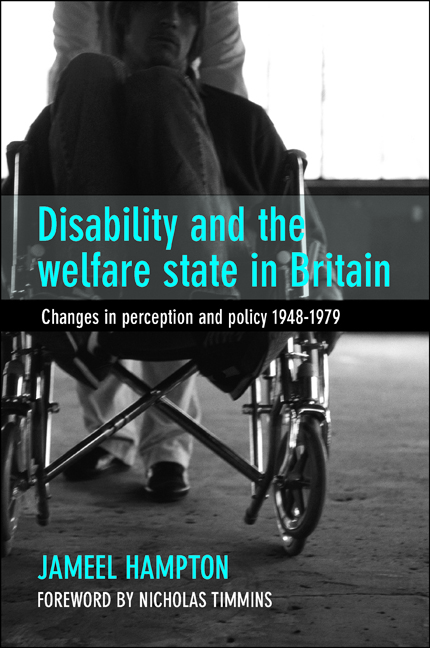Book contents
- Frontmatter
- Contents
- List of tables
- List of acronyms
- About the author
- Acknowledgements
- one Introduction
- two The old regime: provision for disabled people before the welfare state
- three Promotional welfare, 1948–63
- four The emergence of disabled people, 1964–69
- five Cinderella of the welfare state: legislation for disabled people, 1970–72
- six The final days: disability at the end of the welfare state, 1973–79
- seven The last waltz: epilogue
- eight Conclusions
- Appendix: Ministerial periods of office
- Bibliography
- Index
six - The final days: disability at the end of the welfare state, 1973–79
Published online by Cambridge University Press: 01 September 2022
- Frontmatter
- Contents
- List of tables
- List of acronyms
- About the author
- Acknowledgements
- one Introduction
- two The old regime: provision for disabled people before the welfare state
- three Promotional welfare, 1948–63
- four The emergence of disabled people, 1964–69
- five Cinderella of the welfare state: legislation for disabled people, 1970–72
- six The final days: disability at the end of the welfare state, 1973–79
- seven The last waltz: epilogue
- eight Conclusions
- Appendix: Ministerial periods of office
- Bibliography
- Index
Summary
Timeline, 1973–79
1973
October OPEC crisis. Coal and fuel prices rise.
December Jimmy Martin scandal.
1974
January Three-day week begins, to conserve electricity and coal.
February Election: Labour (301), Conservatives (297), Liberals (14), Others (21).
March Barbara Castle becomes Secretary of State for Social Services. Alf Morris becomes Minister for the Disabled.
September Castle announces plans for Mobility Allowance, Invalid Care Allowance and NCIP.
October Election: Labour (319), Conservatives (277), Liberals (13), Others (24).
1975
November Cash limits introduced on spending for the first time.
1976 Unemployment reaches 1.5 million; Callaghan speeches confirm end of full employment.
January NCIP and Mobility Allowance become available.
April Callaghan becomes Prime Minister; Castle is dismissed as Secretary of State for Social Services.
July Invalid Care Allowance becomes available.
September Callaghan government approaches IMF for loan.
Introduction
This chapter concentrates largely on 30 consummate months, January 1973 to the settlement of cash benefits in July 1975. Disabled people seemed to have made great gains, and their exclusion from the welfare state appeared to have ended.
The political situation in 1974 was favourable to increased social expenditure, and disabled people now had sufficient political and public profile to take advantage. Four new cash benefits were created: the Invalid Care Allowance, the Mobility Allowance, the Non-contributory Invalidity Pension and the Housewives Non-contributory Invalidity Pension. For services, progress in fulfilling the terms of the CSDP was now expected, and the state of play on the ground began to be scrutinised in academic studies. The cash benefits violated the contributory principle, and seemed to add up to a national disability income when the HNCIP was made law in July 1975. DIG largely began to disband, having seemingly achieved its objective. Then came the imposition of cash limits on spending and the end of the welfare state in 1976.
Why did the postwar settlement implode just at the time disabled people were finally gaining recognition? Britain was in recession in 1973 and 1974 with the crashes of the New York and London stock exchanges. The OPEC crisis had a great adverse effect on the National Balance of Payments – GDP shrank by 0.8 per cent in the second half of 1973, and 4.3 per cent in 1974. The three-day week in January and February 1974 was a psychological blow, and many started to question the validity of the Keynesian system that had prevailed since the Second World War.
- Type
- Chapter
- Information
- Disability and the Welfare State in BritainChanges in Perception and Policy 1948-79, pp. 181 - 230Publisher: Bristol University PressPrint publication year: 2016



